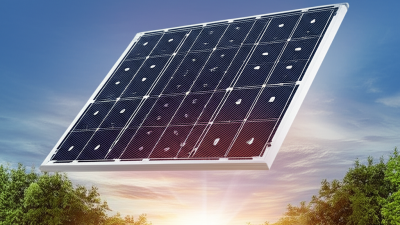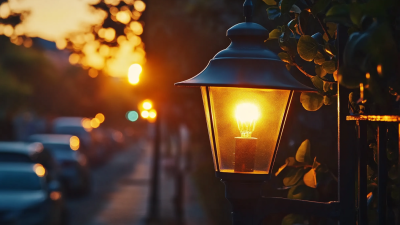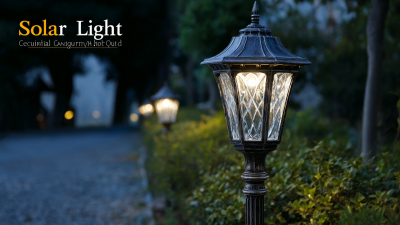Temporary & Portable Solar Lighting
How to Choose the Best Solar Street Lights for Your Outdoor Space
As urban areas continue to expand, the demand for sustainable and efficient lighting solutions has skyrocketed. According to a report by MarketsandMarkets, the global solar street lighting market is expected to grow from $3.2 billion in 2020 to $8.4 billion by 2025, at a compound annual growth rate (CAGR) of 20.6%. This significant growth can be attributed to the increasing focus on renewable energy sources and the need for energy-efficient street lighting solutions. Solar street lights outdoor not only reduce electricity costs but also minimize carbon footprints, making them an ideal choice for municipalities and property owners alike.

As you consider options for illuminating your outdoor spaces, understanding how to select the best solar street lights is crucial for maximizing both functionality and aesthetic appeal. In this blog, we will provide insightful tips to help you make an informed decision that aligns with your specific needs and environmental goals.
Understanding Solar Street Light Technologies: Comparing LED, Solar Panels, and Battery Systems
 When selecting solar street lights for your outdoor space, it's crucial to understand the technologies that power them. The three primary components of these systems are LED lights, solar panels, and battery systems. According to a report by Grand View Research, the global solar street lighting market is expected to reach $9.6 billion by 2026, driven significantly by improvements in LED technology. LED lights are known for their energy efficiency and long lifespan, often exceeding 50,000 hours, which translates into reduced replacement costs over time.
When selecting solar street lights for your outdoor space, it's crucial to understand the technologies that power them. The three primary components of these systems are LED lights, solar panels, and battery systems. According to a report by Grand View Research, the global solar street lighting market is expected to reach $9.6 billion by 2026, driven significantly by improvements in LED technology. LED lights are known for their energy efficiency and long lifespan, often exceeding 50,000 hours, which translates into reduced replacement costs over time.
Solar panels are essential for harnessing sunlight and converting it into electricity. Reports from the National Renewable Energy Laboratory (NREL) indicate that advancements in solar panel efficiency have led to products that can reach up to 22% efficiency under standard testing conditions. This means more power generation for extended usage at night or on cloudy days. Additionally, the battery systems, typically lithium-ion or lithium iron phosphate, play a crucial role in storing energy. These batteries can often last over 2,000 cycles, providing reliable service for several years. Understanding these technologies ensures you choose the best solar street lights that fit your specific outdoor needs.
Key Factors to Consider When Choosing Solar Street Lights for Your Outdoor Space
When selecting solar street lights for your outdoor space, several key factors play a critical role in ensuring you choose the best options. Firstly, consider the brightness level, measured in lumens. According to the U.S. Department of Energy, for public pathways, a lumen output of 300-500 is typically effective, while residential areas may suffice with 100-200 lumens. Assessing the specific lighting needs based on the area's usage and safety requirements will guide your choice.
Another important aspect is battery capacity and solar panel efficiency. A report from the International Renewable Energy Agency highlights that solar panels should ideally convert at least 15% of sunlight into electricity for optimal performance. Look for products with high-quality lithium batteries that ensure long-lasting power and require minimal maintenance.
Tips: When planning your installation, ensure that your solar lights are placed where they receive ample sunlight throughout the day. Additionally, opting for products with motion sensors can enhance energy efficiency and provide extra security, as they will only activate when movement is detected. Consider also the durability of materials; weather-resistant fixtures will provide a longer lifespan in outdoor environments.
Evaluating Brightness and Lumens: Ensuring Adequate Illumination for Safety and Visibility
When selecting solar street lights for your outdoor space, one of the most critical factors to consider is the brightness and lumens output. Lumens measure the total amount of visible light emitted by a source, making it essential to evaluate these figures to ensure sufficient illumination. For safety and visibility, it's recommended that solar street lights provide at least 800 to 1,200 lumens. This range typically offers adequate brightness for pathways, parking lots, and other outdoor areas.
Tip: Always assess the specific area needing lighting. A residential driveway may require fewer lumens than a commercial parking lot. Additionally, consider the height at which the lights will be mounted; higher fixtures often need higher lumens to maintain visibility at ground level.
Another crucial aspect is the color temperature, which affects how the light appears in the environment. A color temperature between 3000K to 5000K tends to provide a warm, inviting light, while higher temperatures can offer a stark, daylight-like brightness.
Tip: Balance aesthetics and functionality by picking lights that complement your outdoor decor while providing ample illumination for safety. Always test different options to see how they perform in real-world conditions before making a final decision.
How to Choose the Best Solar Street Lights for Your Outdoor Space - Evaluating Brightness and Lumens
| Feature | Description | Value |
|---|---|---|
| Lumens | Brightness output of the light | 800 - 1200 lumens |
| Solar Panel Size | Dimension of the solar panel for energy absorption | 20 - 40 watts |
| Battery Capacity | Energy storage capacity of the battery | 6000 - 12000 mAh |
| Material | Composition of the light fixture | Aluminum, Polycarbonate |
| Mode of Operation | Different lighting modes available | Auto, Motion Sensor, Constant |
| Water Resistance | Protection against water ingress | IP65 rated |
| Installation Type | How the light can be mounted | Pole mount, Wall mount |
| Warranty | Duration of the manufacturer's warranty | 1 - 3 years |
Assessing Durability and Weather Resistance for Long-lasting Outdoor Lighting Solutions
When choosing solar street lights for your outdoor space, assessing durability and weather resistance is crucial for ensuring long-lasting performance. According to a recent industry report by the National Renewable Energy Laboratory (NREL), solar street lights that are designed to withstand extreme weather conditions can outperform standard models by up to 30% in terms of lifespan. With the right materials, such as aluminum housing and tempered glass, these lights can resist corrosion and impact from harsh environmental elements.
Moreover, it’s vital to consider the light fixture's IP (Ingress Protection) rating, which indicates its resistance to dust and water. A fixture with an IP65 rating, for example, is dust-tight and can withstand water jets from any direction. Data from the Global Solar Lighting Market Report suggests that products with higher IP ratings are increasingly favored, as they offer superior protection against the challenges posed by rain, snow, and UV exposure. This focus on durability not only enhances the operational life of the solar lighting systems but also contributes to reduced maintenance costs, making it a smart investment for any outdoor space.
Cost-Effectiveness of Solar Street Lights: Analyzing Initial Investment and Long-term Savings
When considering the installation of solar street lights for your outdoor space, a key aspect to evaluate is the cost-effectiveness over time. While the initial investment for solar lighting systems may seem higher than traditional options, it’s essential to analyze the long-term savings that come with choosing solar technology. Solar street lights typically require no electricity costs, significantly reducing ongoing expenses, especially in areas where electric utility rates are continually rising.

Moreover, maintenance costs are often lower for solar systems since they have fewer moving parts and do not require extensive wiring or infrastructure. With advancements in solar technology, many products now come with extended warranties, ensuring that your investment is safeguarded for years to come. By factoring in these long-term benefits, property owners can see a greater return on investment, making solar street lights not only a sustainable choice but also a financially sound one for enhancing outdoor spaces.
Related Posts
-

Future Innovations in Best Solar Pathway Lights Outdoor Driving Global Procurement Trends in 2025
-

Unlock Global Savings: High-Quality LED Solar Lights from China's Leading Manufacturer
-

How to Choose the Best Solar Path Lights for Your Outdoor Space
-

Choosing Quality Manufacturers for Best Outdoor Solar Lights to Illuminate Your Home
-

Setting New Industry Standards for the Best Solar Lamp Outdoor: A Global Perspective
-

Top Quality Best Solar Light Outdoor Manufactured in Leading Chinese Factories
USA / Americas
1507 Capital Ave, Suite 102
Plano, TX 75074
+1 (214) 838-7010
8:00am – 5:00pm (GMT-6)
Australia / Asia Pacific
503 Cross Keys Rd,
Cavan SA 5094
+61 8 7200 3909
9:00am – 5:00pm (ACDST)
© 2025 Green Frog Systems. | Privacy Policy | Terms & Conditions


